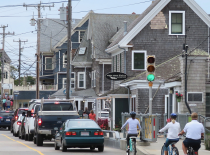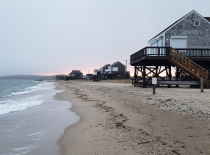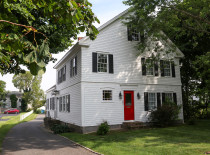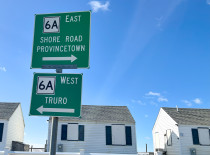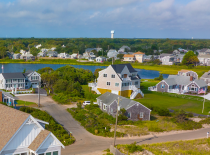Keyword: mpo
Each year, the Cape Cod Commission receives funding through the Massachusetts Executive Office of Housing and Livable Communities’ District Local Technical Assistance (DLTA) program. This initiative enables the Commission to support Cape towns with technical planning assistance that fosters sustainable development and aligns with both state and regional priorities. This year, DLTA funding is helping advance two important local housing initiatives in the towns of Sandwich and Falmouth, each addressing different but important aspects of housing development and smart growth.
To help towns proactively address risks associated with severe storms and the growing impacts of climate change, the Cape Cod Commission works closely with local municipalities to develop Federal Emergency Management Agency (FEMA)-certified multi-hazard mitigation plans. These plans serve as critical tools for identifying and reducing vulnerability to climate change-induced disasters, improving emergency preparedness, and strengthening resilience across the region.
The Cape Cod Climate Action Plan encourages the region to support low- and no-carbon transportation alternatives, expand charging infrastructure, and promote programs that increase EV adoption. Since 2020, EV ownership on Cape Cod has nearly tripled, and charging infrastructure continues to grow. The Cape Cod Commission supports this progress through a range of initiatives, including several new programs focused on expanding EV access, improving infrastructure, and promoting equity.
The Cape Cod Commission is developing program frameworks to preserve and expand year-round housing opportunities. This work, undertaken in partnership with Outwith Studio, builds on recommendations outlined in the Cape Cod Regional Housing Strategy and aims to identify practical, effective ways to incentivize and support year-round residents.
During a meeting held on June 16, 2025, the Cape Cod Metropolitan Planning Organization (MPO) released the Federal Fiscal Year (FFY) 2025-2029 Transportation Improvement Program (TIP) Amendment #5 for a 21-day public review and comment period. FFY 2025-2029 TIP Amendment #5 would program an additional $5,284,636 in FFY2026 using Statewide TIP funds to match the updated project cost for Phase 1 of Bourne Rail Trail construction. View the proposed amendment at www.capecodcommission.org/tip.
May is National Historic Preservation Month, a time to celebrate the importance of preserving the places that shape our communities and reflect our shared history. On Cape Cod, historic preservation plays a vital role in protecting the character and charm that define the region.
The Cape Cod Metropolitan Planning Organization (MPO) welcomed Luisa Paiewonsky, Executive Director of the Megaprojects Delivery Office of the Massachusetts Department of Transportation (MassDOT), to its May 19, 2025 meeting for an update on the progress of the Cape Cod Bridges Program.
The Cape Cod Commission invites members of the public to get involved with the ongoing Route 6A Transportation Visioning Study and to share their experiences along the roadway using the online public comment tool or attend an upcoming public meeting.
With support from a grant awarded by the Massachusetts Office of Outdoor Recreation (MOOR), within the Executive Office of Energy and Environmental Affairs, the Commission will collaborate with the Cape Cod Chamber of Commerce and the Compact of Cape Cod Conservation Trusts to create a comprehensive database featuring detailed site descriptions and images of recreational areas across Cape Cod. The project aims to improve planning and public access to information about the region's diverse natural resources.
A framework for establishing a Cape Cod Housing Trust and Housing Land Bank is complete. Created in collaboration with consultants Outwith Studio and Utile along with land bank consultants out of Ohio, the framework provides recommendations and next steps for potentially establishing the entity(ies) based on feedback received from stakeholders at numerous meetings throughout the fall and early winter. The framework emphasizes sustainable development and the importance of community engagement in ultimately bringing the entities to life.
